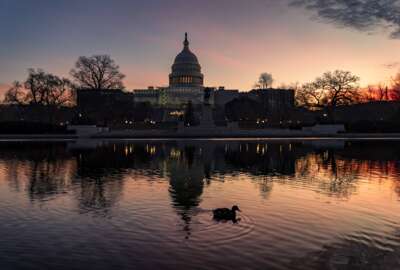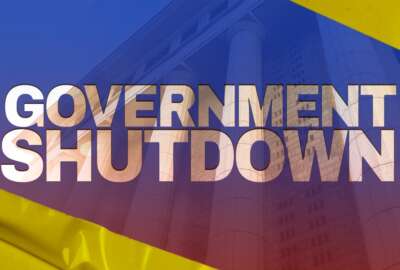A government shutdown Q&A for federal employees
Federal News Network is answering both common and specific questions on the impacts of a partial government shutdown on pay, benefits, retirement and more.
Editor’s note: This story was updated March 18 with information about leave accrual, the Thrift Savings Plan and unemployment, as well as more pay details. Federal News Network will continue to update this page with more questions and answers as they arise.
Earlier this month, President Joe Biden signed a $460 billion spending package to avoid a partial government shutdown for many agencies. But funding agreements for fiscal 2024 are only halfway there — and time is running out before the next appropriations deadline in Congress on March 22.
With just days before hundreds of thousands of federal employees could face a government shutdown, many are asking questions about the impact of a shutdown on health care, pay, retirement, leave and much more.
Federal News Network is compiling answers to both common and specific questions to help you prepare and understand how the potential government shutdown will impact you and your agency.
If you have more questions about the impact of a shutdown, you can fill out our website comments form, or reach out to us on X (Twitter), Facebook or LinkedIn.
Pay
If there is a shutdown, who continues working?
Most civilian federal employees are placed in one of three categories: furloughed, excepted or exempt. Furloughed employees stop working during a shutdown and aren’t paid until the end of the shutdown. Excepted employees continue to work, but similarly are not paid until after the shutdown is over. Exempt employees work in positions that are financed through a funding source other than annual appropriations, so they continue to work and get paid as normal during a shutdown.
Agencies are responsible for updating their shutdown contingency plans to determine which employees fall into which categories. OMB currently lists more than 100 contingency plans covering every large, small and micro agency. In the time since the first shutdown threat arose back in September 2023, all agencies have updated their plans.
A Federal News Network analysis of agencies’ publicly-available plans for appropriations lapses shows that more than 1.5 million feds would be either exempt or excepted from shutdown furloughs.
If I am furloughed or excepted, will I eventually get paid?
Yes. A 2019 law ensures that both furloughed and excepted employees will get paid once a shutdown ends. Federal payroll providers are expected to process checks as soon as the lapse in appropriations ends, regardless of the next scheduled pay date. Federal contractors, on the other hand, are not guaranteed backpay and it is up to each company to make that decision for its employees.
Will I still get paid for my hours worked up until the shutdown deadline, but for a paycheck that isn’t scheduled to go out until after that?
Yes. If a shutdown occurs in the middle of a pay period, employees will still receive paychecks on time for work they did prior to the start of the shutdown. A small number of payroll staff will be excepted and continue to work during a shutdown to process and issue these payments.
If I’m an excepted employee, will I still get premium pay for overtime hours?
Yes. If an excepted employee performs authorized overtime work, they will be paid for it at a premium rate. The same applies to Sunday premium pay, night pay, availability pay and all other types of premium payments.
But of course, excepted employees won’t receive any payments for that work until after the end of a shutdown.
Do intermittent employees who get furloughed still get retroactive pay?
Yes. Intermittent employees who get furloughed during a shutdown are entitled to backpay at their standard pay rate once a shutdown ends. Agencies are expected to pay intermittent employees for an estimated number of hours they would have worked during that time. The estimate can be based on the employee’s recent work history or any agency-specific plans.
Do members of Congress still get paid during a shutdown?
Yes. Members of Congress, by law, receive their full paychecks throughout a government shutdown. But congressional support staff generally do not receive pay during a shutdown, if there is no appropriated funding for legislative branch activities.
The President also continues to receive a paycheck during a shutdown, as do Supreme Court justices and all appointed justices.
Leave and travel
Does a shutdown affect accrual of annual leave or sick leave?
No. Furloughed employees continue to accrue annual leave and sick leave as normal — as long as there was no other reason aside from a shutdown that the employee was put on a “non-pay” status, according to the Office of Personnel Management.
Excepted employees also continue to accrue leave as normal even though they aren’t being paid during a shutdown.
Does leave taken through the Family and Medical Leave Act (FMLA) during a shutdown still count toward my total leave hours?
No. Any FMLA leave will be considered “canceled” during a shutdown and won’t count toward an employee’s 12-week total, OPM said. The same applies to all types of scheduled leave — it has to be canceled during a shutdown. Those days count as “furlough days,” rather than time counted toward leave hours.
What if I had planned to go on vacation during a shutdown? Can I still go on my trip?
It depends. Excepted employees can take paid leave during a shutdown as they would normally if there isn’t a shutdown happening. They can take the leave through one of two options.
The first option for excepted employees is to simply request time off and earn approval from their supervisors as normal. If employees choose this option to take time off, their agencies will charge their personal leave banks as they would during any other circumstances.
The second paid leave option for excepted employees is to be placed on “default furlough status” for any approved absence during a government shutdown. If excepted employees take this route, their agencies will not charge their personal leave banks. Any hours of approved leave would be considered “furloughed hours.”
Notably, excepted employees will not receive pay for their time off until after the shutdown ends.
Excepted employees who don’t show up for work during a shutdown and don’t have supervisor approval for the time off are considered “absent without leave” (AWOL) for the duration of the absence. It’s up to each agency, based on the individual circumstances, to determine the consequences for an AWOL worker.
Furloughed employees, on the other hand, cannot take paid leave during a shutdown. Any previously approved or scheduled time off will be canceled for furloughed employees.
Would I still be able to travel for work during a shutdown? And what happens if I’m already on work travel when a shutdown starts?
It depends. Most upcoming work travel will be canceled in the case of a shutdown. And if there was a work trip already happening, that trip will end early in most cases.
If an employee who’s on work travel when a shutdown begins returns home promptly, the agency is responsible for paying the travel expenses the employee incurs during the return trip. Employees will get reimbursed for these costs after the end of a shutdown.
There are exceptions if work travel is considered to be work for an excepted activity during a shutdown. In these cases, employees may still be able to go on work travel during a shutdown.
Still, many agencies’ contingency plans say travel should be limited in these cases. The trip should be as short as possible, and only occur if absolutely necessary, and with no other means of completing the excepted activity without it.
Retirement
If I am scheduled to retire before or during a shutdown, will I actually be able to retire?
Yes. Federal employees who submit their retirement applications to their agencies before a shutdown begins, with an effective date during the shutdown, will still be considered retired. Retiring feds will begin receiving interim annuity payments while OPM processes their applications.
During a shutdown, already-retired feds continue to receive scheduled annuity payments as normal.
Can I submit my retirement application during a shutdown?
Yes, but getting it processed might be more difficult.
OPM Retirement Services continues to work during a shutdown, since it’s funded through a trust fund. But OPM staff cannot process a retirement application without first receiving the completed application from a retiring employee’s agency. Processing can be delayed in cases where payroll employees at a feds’ employing agency are furloughed. If your agency or payroll center hasn’t submitted your retirement application — or if the application is incomplete — you’ll likely see processing delays, OPM said shutdown guidance in January.
And again, retiring feds will get interim annuity payments while OPM processes their applications.
Thrift Savings Plan and payment obligations
What happens if I miss a Thrift Savings Plan loan payment during a shutdown?
If TSP participants miss a loan payment during a shutdown, they will not be placed in a default status on their loan. This adjustment happens automatically, so participants do not need to contact TSP for these cases.
Automatic paycheck deductions for loans are also paused during a shutdown because, of course, there is no paycheck to deduct from. Participants can still send in direct loan payments if they choose.
Since the Federal Retirement Thrift Investment Board (FRTIB) is a non-appropriated agency, TSP operations continue normally during a shutdown.
Can I take out a new TSP loan during a shutdown?
Yes. TSP loans are available to participants even during a shutdown. TSP participants can take out up to two loans at a time.
Since TSP operations continue as normal during a shutdown, TSP participants can still make investments, withdrawals, apply for loans and take any other standard actions.
In the case of a shutdown, FRTIB will post all TSP communications and any updates on a shutdown information page on TSP’s website.
What happens if I can’t meet personal payment obligations? Could I face a foreclosure, eviction or loan default?
There are currently no broad legal protections for federal employees against these risks.
But a few members of Congress reintroduced a bicameral bill in 2023 to try to change that. The Federal Employee Civil Relief Act, if enacted, would let federal employees and contractors postpone certain types of payments during government shutdowns, or if the government defaults on its debt. If the bill is passed, feds would get a 30-day cushion, after a government shutdown ends, before they would have to make payments on loans and other types of financial obligations.
So far, the bill has not had any action beyond its introduction in March 2023.
But many companies do offer relief for feds during a shutdown and are already making preparations to do so.
Insurance and Open Season
Will I still have health insurance coverage during a shutdown?
Yes. Even if an agency doesn’t pay health premiums on time to OPM, federal employees and other Federal Employees Health Benefits (FEHB) program enrollees will maintain health coverage throughout the duration of a shutdown, OPM said. That also includes coverage through the Federal Employees Dental and Vision Insurance Program (FEDVIP), the Federal Employees’ Group Life Insurance (FEGLI) program and the Federal Long Term Care Insurance Program (FLTCIP).
That change came after regulations from OPM in 2021 allowed health coverage for both furloughed and excepted employees to simply continue during a shutdown.
Do I have to pay insurance premiums during a shutdown if I am not paid?
No. While all FEHB participants maintain health coverage during a shutdown, those who are excepted or furloughed are not expected to pay health premiums. Enrollees will have to make payments for premiums that accumulate during a shutdown once a shutdown ends.
Does Open Season still happen if there’s a shutdown?
Yes. Enrollees in FEHB and FEDVIP can still make changes to their 2024 plan options during Open Season, even in the case of a government shutdown. This includes furloughed, excepted and exempt employees.
That’s because OPM, which runs FEHB and FEDVIP, finances the federal programs through trust funds rather than appropriations.
About three-quarters of all OPM employees and functions are exempt from a shutdown, including employees in the health care and insurance office, according to OPM’s agency contingency plan. Exempt employees’ jobs are funded outside the appropriations process. Therefore, they continue to work and get paid during a shutdown, at least until those alternative funds run out.
OPM’s health insurance trust fund has “sufficient amounts to operate … throughout the duration of any lapse in appropriations,” OPM said in its contingency plan.
The changes to health insurance operations during a shutdown are relatively recent. In 2021, after the 35-day shutdown ended, OPM published a final rule stating that employees will be allowed to enroll or make enrollment changes in FEHB, FEDVIP, FEGLI and FLTCIP during future lapses in appropriations.
Prior to this final rule, furloughed employees or those working without pay during past government shutdowns couldn’t make enrollment changes to FEHB because they were placed in “non-pay” status.
Now with that final rule in place, federal employees should no longer see major disruptions to health and life insurance benefits during a future government shutdown.
Additionally, agency employees who process new dependents or FEHB enrollment changes will be considered excepted during shutdowns, according to OPM’s 2021 rule, meaning they’ll work without pay in the case of a shutdown.
Can I change my options after Open Season ends if there’s a shutdown at that point?
No. Per usual, aside from during Open Season or after experiencing a qualifying life event, FEHB enrollees cannot make changes to their health care options throughout the rest of the year. Furloughed employees will not have the opportunity to terminate or cancel FEHB coverage during a shutdown simply because they get furloughed, OPM said.
However, furloughed employees who experience a qualifying life event during a shutdown can still make changes to their FEHB enrollments.
Other impacts
Do agency offices stay open during a shutdown?
It depends. Offices remain open for excepted employees who continue to work without pay during a shutdown. But offices for other government operations deemed non-excepted may close. In the past, government shutdowns have temporarily shuttered national parks, IRS offices, Social Security offices and more.
Are non-appropriated fund agencies and employees affected by a shutdown?
Generally, no. Agencies and employees that are not funded by congressional appropriations are exempt from a government shutdown, continue working and continue to get paid. But a small number of employees working at non-appropriated fund agencies are partially paid through appropriated funds, which may lead to some furloughs. Additionally, if a government shutdown leads to a reduction in business operations, employees who may not otherwise be directly affected by a shutdown can still be furloughed.
Can I file for unemployment?
It depends on where you live. Furloughed employees can become eligible for unemployment compensation, but the state law applies for wherever the federal employee’s last official duty station was located. Some states require a one-week waiting period before an individual can qualify for unemployment payments. If filing for unemployment, your state will require you to provide your agency’s federal identification code.
Employees can find more information about individual state offices and unemployment compensation for federal employees on the Department of Labor’s website.
Copyright © 2025 Federal News Network. All rights reserved. This website is not intended for users located within the European Economic Area.
Drew Friedman is a workforce, pay and benefits reporter for Federal News Network.
Follow @dfriedmanWFED






